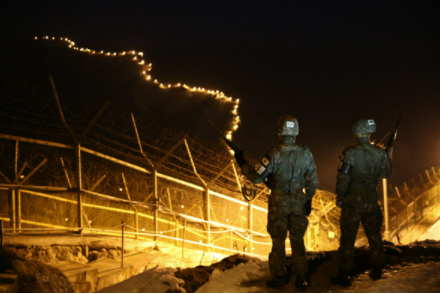The Effect of ARMY Professionals` Perceptions of the System on Organizational Commitment: The Mediation Effects of ..
Military
Views. 1782
Abstract
Purpose: The purpose of this study is to analyze the mediation effect of professional identity in the process of the effect of Army professionals` perceptions of the system on organizational commitment, and to draw policy implications for the training and utilization of effective professionals.Methods: The survey was conducted on Army professionals and the hypothesis was verified using structural equations(AMOS18.0).
Results: First, system trust did not have a significant effect on professional identity. Second, system internalization had a positive(+) effect on professional identity. Third, the indirect effect of professional identity was not significant in the relationship between system trust and organizational commitment. Fourth, the indirect effect of professional identity was significant in the relationship between system internalization and organizational commitment.
Conclusion: First, it is necessary to consider the organizational level of professional personnel management system that allows professional personnel officers to have a positive perception and agree with its purpose. Second, in the process of system change, the situation and opinions of the army specialist officers who are subject to the system change should be reflected as much as possible, and the detailed consideration of the organizational level that makes them well accept the purpose and purpose of system change is necessary. Third, when the Army professional personnel officers are provided with conditions to work with a high professional identity and implement related policies, their organizational commitment can be increased.
[Keywords] Professional Identity, System Internalization, System Trust, Organizational Commitment, Army Professionals
References
[1] Oh HS & Sung EM. Trend Analysis of Expert Society through Changing Profession. The Journal of Vocational Education Research, 29(2), 205-223 (2010).
[4] Kang Y & Lee M & Im Y. The Influence of Expert Orientation and Job Challenge on Organizational Commitment of Army Professional Manpower: The Mediating Role of Professional Identity. Journal of National Defense Studies, 58(2), 83-112 (2015).
[5] Khilji SE & Wang X. Intended and Implemented HRM: The Missing Linchpin in Strategic Human Resource Management Research. The International Journal of Human Resource Management, 17(7), 1171-1189 (2006).
[6] Kostova T. Transnational Transfer of Strategic Organizational Practices: A Contextual Perspective. Academy of Management Review, 24(2), 308-324 (1999).
[7] Park SJ & Im YS. A Case Study on the Core Competencies of Military Leadership for Junior Officers. International Journal of Military Affairs, 5(1), 1-12 (2020). [Article]
[8] Park SJ & Im YS. A Study on the Development of Kma Leadership Evaluation System(KMALES). International Journal of Military Affairs, 6(1), 36-42 (2021). [Article]
[9] Rabinowitz S & Hall DT. Organizational Research on Job Involvement. Psychological Bulletin, 84(2), 265-288 (1977).
[10] Lodahl T M & Keiner M. The Definition and Measurement of Job Involvement. Journal of Applied Psychology, 49(1), 24-33 (1965).
[11] Kim JH & Kim KH. The Study of the Relationship between Self-efficacy and Organizational Effec-tiveness: Focus on the Mediate Effects of Professional Identity. Journal of Community Welfare, 32, 107-127 (2010).
[12] Jung BS. Factors Affecting Korea Army Officers’ Achievement in Professional Development Edu-cation. International Journal of Military Affairs, 2(2), 1-7 (2017). [Article]
[13] Lee DG & Park SJ & Im YS. A Study on the Facilitation Factors of Non-commissioned Officer’s Field Leadership: Focused on Delphi and AHP Method. International Journal of Military Affairs, 5(2), 43-53 (2020). [Article]
[14] Lim YJ & Park GY & Bang WS. Stress Management of Korean Military Leaders. International Journal of Military Affairs, 3(2), 1-7 (2018). [Article]
[17] Kim WB & Rhee KY. Trust as Social Capital and Organizational Commitment. The Korean Socio-logical Association, 36(3), 1-23 (2002).
[19] Hall DT. A Theoretical Model of Career Subidentity Development in Organizational Settings. Or-ganizational Behavior and Human Performance, 6(1), 50-76 (1971).
[20] Snizek WE. Hall's Professionalism Scale: An Empirical Reassessment. American Sociological Review, 37(1), 109-114 (1972).
[22] Allen NJ & Meyer JP. Affective, Continuance, and Normative Commitment to the Organization: An Examination of Construct Validity. Journal of Vocational Behavior, 49(3), 252-276 (1996).
[2] Choi WG. A Study on the Improvement Direction of the Specialized-degree Program in the Com-missioned Education: Focusing on the ROK Army. Yonsei University, Master’s Thesis (2006).
[15] Kang HH. A Study on the Influence Factors of Trust in the Institution: Focusing on the National Pension System. Ewha Womans University, Doctoral Thesis (2009).
[18] Kim JH. An Empirical Study on the Relationship between Human Resource Management System and Enterprise Performance: Focusing on the Mediating Effects of Internalization, Employee En-gagement, and Cynical Atmosphere. Hanyang University, Doctoral Thesis (2004).
[21] Park JW. A Study on the Professional Identity of Social of Social Worker. Seoul National University, Doctoral Thesis (1994).
[23] Choi SY. A Study on the Organizational Citizenship Behavior of Social Workers: Focusing on the Relationships among the Organizational Justice, Trust in Supervisor, Organizational Cynicism, and Affective Commitment. Ewha Womans University, Doctoral Thesis (2005).
[3] Army Headquarters. Directions for Implementing the Personnel Management System for Profes-sionals. Army Headquarters (2010).
[16] Kramer RM & Tyler TR. Trust in Organizations: Frontiers of Theory and Research. Sage (1995).
[24] Stevens JP. Applied Multivariate Statistics for the Social Sciences. Lawrence Erlbaum (2002).

? Source: hani.co.kr
